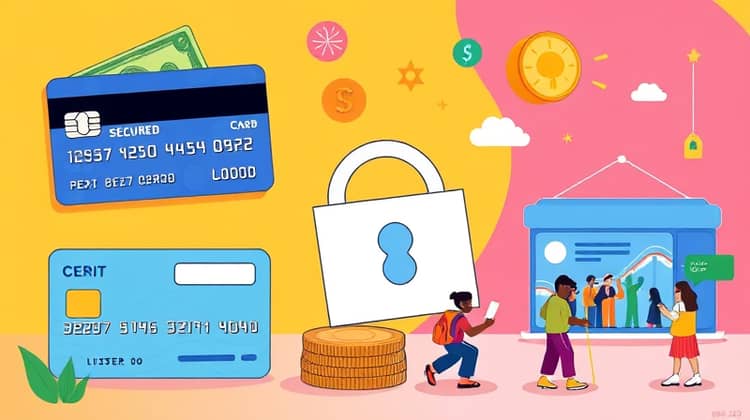Student's Guide: How to Choose Your First Credit Card Wisely

Choosing your first credit card is a significant financial decision that can impact your financial future. As a student, understanding how credit works and how to manage it wisely is essential. This guide will help you navigate the complexities of credit cards, ensuring that you make informed choices as you embark on your financial journey.
Credit cards can offer convenience, build your credit history, and provide rewards; however, they also come with responsibilities. Mismanaging credit can lead to debt and a poor credit score, making it harder to secure loans or housing in the future. This guide will explore key elements you need to consider when selecting your first credit card, along with tips for responsible usage.
By understanding credit cards, recognizing their importance in building a solid credit history, and knowing what features to look for, you'll set yourself up for financial success and greater purchasing power later in life. Let’s start with the basics of credit cards.
1. Understanding Credit Cards

A credit card is a financial tool that allows you to borrow money from a lending institution to make purchases, which you will pay back over time. Each month, you receive a bill that includes the total amount borrowed, as well as any applicable interest and fees. Understanding how to use a credit card responsibly can help you maintain good financial health and build a positive credit history, which is essential for future financial endeavors.
Credit cards come in various forms and offer different features, rewards, and terms. Before applying for one, it's crucial to understand the basics such as interest rates, credit limits, fees, and how they can affect your credit score. Knowing these elements can prevent you from falling into credit traps that many first-time users encounter.
- Credit limit: The maximum amount you can charge on your card.
- Interest rate (APR): The annual percentage rate charged on any outstanding balance.
- Fees: Possible charges for late payments, cash advances, foreign transactions, etc.
- Rewards: Points, cash back, or benefits for using your card.
Understanding these components of credit cards will equip you with the knowledge needed to handle your card wisely.
2. Why Building Credit is Important

Building credit is crucial, especially for students who are preparing for life after school. Good credit history enables access to loans, credit cards, and even rental options that might otherwise be unavailable. A higher credit score can also lead to lower interest rates, saving you money in the long run.
When you start building credit early, you set a foundation for your financial future. The habits you cultivate today can impact your access to financial products and services for years to come. Lenders, insurance companies, and even employers consider your creditworthiness when making decisions that affect your life.
- Qualifies you for loans and better interest rates in the future.
- Can lower insurance premiums and rentals fees.
- Improves your chances of being approved for apartments or homes.
- A good credit score can reduce the cost of future credit applications.
Therefore, it is important to take the initiative to build your credit responsibly from an early age.
3. Key Features to Look for in a Student Credit Card

When selecting a credit card, especially as a student, there are specific features that can enhance your experience and help you manage your credit effectively.
- No annual fee: Many student credit cards do not charge an annual fee, which can save you money.
- Low-interest rates: Student cards typically offer lower interest rates to help students manage their debts.
- Rewards program: Look for cards that provide cash back or rewards for your purchases.
- Flexible payment options: Choose a card that allows you to pay your balance in ways that suit your financial situation.
Ensuring that your first credit card has these key features will provide you with the best chance of managing your finances responsibly.
4. Tips for Using Your First Credit Card

Using your first credit card wisely is essential to developing good credit habits. Here are some tips to help you get started. Remember, responsible usage of credit can determine your financial future.
Set a budget and stick to it. Treat your credit card like cash; spend only what you can afford to pay back.
- Make at least the minimum payment each month to avoid fees and damage to your credit score.
- Pay your balance in full if possible to avoid interest charges.
- Keep your credit utilization under 30% of your available credit limit.
- Regularly check your statement for unauthorized transactions, ensuring you report any issues promptly.
These practices will set the stage for a solid credit foundation.
5. How to Apply for a Student Credit Card

Applying for your first credit card can seem daunting, but understanding the process can make it easier. Start with research to find the student credit cards that best fit your financial situation. Look for ones with favorable terms and features that align with your spending habits.
Once you have narrowed down your options, gather necessary information such as your identification, Social Security or taxpayer ID number, income, and expenses.
- Check your eligibility through the issuer's website or a credit card comparison tool.
- Fill out the application online or in-person at the bank or credit union.
- Submit any required documents and wait for approval, which may take a few minutes to a few days.
This process can help you take the first step toward building your credit history.
6. Mistakes to Avoid

It's easy for first-time credit card users to make mistakes that can lead to financial troubles. Avoiding these common pitfalls will help you maintain good credit habits.
One of the biggest mistakes is missing payment deadlines. This can incur late fees and damage your credit score.
- Avoid overspending or using your credit card for non-essential purchases. This can create debt that is hard to repay.
- Do not ignore your monthly statements; they provide key information on your spending habits and payment requirements.
- Avoid applying for multiple credit cards at once; each application can temporarily decrease your credit score.
Being aware of these common mistakes will protect your financial health as you embark on your credit journey.
7. Alternatives to Credit Cards

If you’re hesitant about committing to a credit card, there are several alternatives that can serve to build your credit history or manage your finances. While credit cards have their benefits, understanding other options can diversify your financial toolkit.
One option is a secured credit card, which requires a cash deposit as collateral. This can help you build credit while minimizing risk.
- A debit card linked to your checking account provides direct access to your funds without the risks associated with credit usage.
- Consider peer-to-peer lending platforms that may offer ways to build credit without a traditional credit card.
- For larger purchases, consider using personal loans with lower interest rates.
These alternatives offer financial flexibility and help you manage your spending without the drawbacks of credit cards.
Conclusion

Choosing your first credit card can be overwhelming, but understanding the complexities involved can simplify the process. From understanding basic credit card terms to recognizing the importance of building credit, careful planning leads to successful outcomes.
As a student, gaining positive credit history while keeping your spending in check will prepare you for future financial opportunities. Being responsible with your credit card usage now will yield benefits when you apply for loans, rent apartments, or pursue other financial endeavors later in life.
Additionally, remember that mistakes can happen, but educating yourself on best practices and potential alternatives allows you to navigate challenges effectively.






